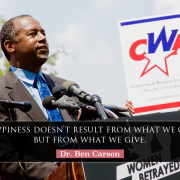How to Be More Influential By Adding Great Value to Others
“Happiness doesn’t result from what we get, but from what we give.” – Dr. Ben Carson
“People don’t know how much you know until you show how much you care.” – Dr. John C. Maxwell
Two of my favorite quotes. You know that people will listen if you share knowledge that helps them. Want to go a little further and get some influence? Add some value to their lives. In today’s post, we’ll be talking about how you can be more influential with people by bringing them value.
So what did you learn from that? Hopefully you got the impression that giving value is important in sales. You say you’re not in sales? O contraire! You definitely are!
Did you know that every day people are selling themselves? Whether it’s a salesperson doing a direct sale or an engineer with a proposal for a project, or a mother trying to get her kid to eat vegetables, everyone is selling. Everyone is thinking about how they’re going to influence their audience (the customer, the client, or kid) to buy their product or services, or eat carrots.
One of the largest difference makers in making that sale is whether or not that person has influence on their audience.
As Jeffrey said, he tries to give value first… and that’s what gets you influence.
Which is much different than what a lot of people do today. Instead of looking for the win-win, they’re looking for the “how can I use this person”? The person who is looking for the win-win is looking how to give value. The second type is taking value. The first one is the influencer while the second one, I think, is the persuader… the manipulator.
Giving Value in our Daily Lives
Before we talk about giving value in our professional life, let’s just make sure we get a better idea of what giving value means for sure. Something simple. Nothing drastic.
If you were to give value in something that you’re already doing right now, how would you do that? You might be thinking that you’d have to start thinking and acting differently than you currently do. But would you really? I’m sure there’s things in your life that you’re already doing for others that give them value. For instance, while I’m the guy of the household, and traditionally men supposedly don’t cook, I know that I can bring value by being the person who cooks dinner on a regular basis.
Think about something you might be good at that you could use to benefit those around you. Believe me, it’ll help later.
Giving Value In our Careers
In the professional space, you might think that people are looking to get ahead of each other by beating each other down. By stealing ideas and contacts. It’s total competition out there – even in the same company. People are trying to beat each other for that next position. So you have to take what you can get! When the boss asks you a question, you better respond with a “Yes, sir!” response.
Right?
Wrong.
First off, that’s not a very confident mindset. People will notice that you’re afraid of the workplace if you have that kind of perspective. So let’s try to look at things from another perspective. One of collaboration.
For one, instead of using that quick to respond with definite answers, let’s try to answer questions with questions. Obviously we don’t want to make it obvious. But let’s try to dig deeper for something that will be a better solution instead of something that’s a quick fix. The more you know about a certain subject, the more thorough you can be about about your solution.
A way you can do that, for example, is enter any meeting that you have with 4 questions that you want to get answered:
What are the goals (short and long term)?
Who is the audience?
What is the capabilities of your group and/or department?
How do you measure success?
As you become a person who helps think things out (as opposed to going to the know it all quick fix), people start coming to you for help.
Another way that you can add value to people is being what’s know as The Connector (as Malcolm Gladwell calls them) or the Linchpin (as Seth Godin refers to them).
The idea of this particular person is that they’re a main hub of a certain network of people. They’re the ones who can carry out a conversation with someone from one year to next without ever acting like time has passed. Generally speaking, these people know where they met someone and what they were doing at the time.
If this sounds like you or you want to become one, I recommend reading The Tipping Point and/or Linchpin to find out more.
The third way that you can add value, or even if you’re unsure, is to ask yourself these three questions:
Is what I’m doing or the acts that I’m performing different but also includes ideas that other people from the group have thought about? (You don’t want to come off as being too maverick!)
Is this a great contribution? Is this work something I’ve strived for excellence in? (Don’t half ass your work. Remember the Agreement: Always do Your Best)
Do I really care about what I did? Did I see this in perspective of helping other people? (Again, think about the quote at the beginning of this post.)
Homework:
The next time you want to influence your peers, family, or audience, think about how you’re going to add value to them. What is something only you can provide to the group? A perspective? Experiences? Make sure you’re providing that information not because you want to manipulate but because you want to truly help. You’d be surprised what will happen as time goes on.




